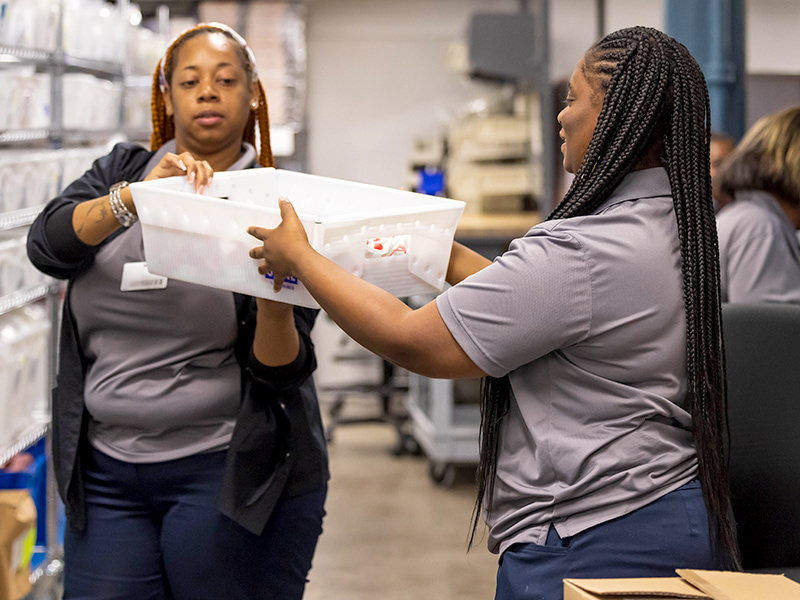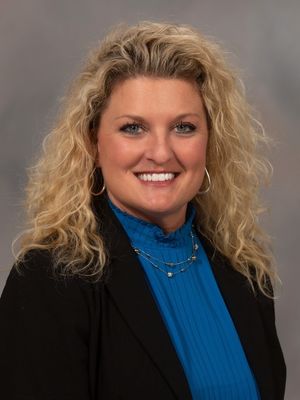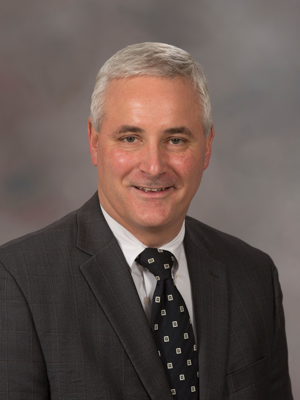Employee Engagement Survey results are in

The University of Mississippi Medical Center provides high-quality care and services and makes every effort to deliver it safely, most employees say.
Fellow employees help those in their work unit to accomplish their tasks, and their work gives them a feeling of accomplishment.
Less than half of employees believe their pay is fair compared to other area health care organizations.
They’re among sentiments expressed in UMMC’s annual Employee Engagement Survey administered May-June 2022. Employees let their voices be heard on “engagement,” or how connected they feel to their workplace, coworkers and the Medical Center’s purpose and goals.

“This feedback is critical for understanding what employees identify as our organization’s strengths and our greatest opportunities to change in order to meet our goal of being a best place to work,” said Molly Brasfield, chief human resources officer.
Employees completed the confidential survey online. Those who provide direct care or services to patients took the Culture of Safety Survey. Part-time employees who work fewer than 20 hours a week took the Employee Engagement Survey, and if they provide care or services to patients, also took the Culture of Safety Survey.
The surveys are administered through Press Ganey, a national leader in improving patient and employee experience. About 70 percent of UMMC’s 10,000 employees took part this year. Due to the pandemic, no survey was given in 2021.
Of an overall top score of 5, UMMC’s Employee Engagement Survey was 3.90, a .14 percent decrease from 2020. The Culture of Safety survey score was 3.87. The group giving the highest average score on Employee Engagement was those with advanced degrees who are not medical doctors, at 4.10. The lowest was registered nurses, an average of 3.77.

“We want our employees to be supported and to feel fulfilled in their workplace. When we do these things well, we will have high engagement – but, we do it because it’s the right thing to do,” Brasfield said.
The engagement queries included:
- I’d like to be working here three years from now: 73 percent favorable.
- I’m proud to tell people I work for UMMC: 79 percent favorable.
- Overall, I’m a satisfied employee: 71 percent favorable.
- I’d stay with UMMC if offered a similar position elsewhere: 60 percent favorable.
- I’d recommend UMMC as a good place to work: 70 percent favorable.
- I’d recommend UMMC to family and friends who need care: 75 percent favorable.
At an institutional level, UMMC’s highest performing items versus national averages included that employees feel the person they report to is a good communicator, employees respect the abilities of the person to whom they report, and employees feel their manager cares about their job satisfaction and encourages teamwork.
In the lowest-performing areas, 40 percent of employees say their pay isn’t fair compared to other health care employers in the area. Other areas needing work include communication between medical personnel, employees believing the amount of job stress they feel is reasonable, and employees believing their mind is freed from work after hours.

“We are systematically reviewing pay throughout all disciplines in the system – everything from nurses to technologists to non-clinical positions,” said Britt Crewse, chief executive officer of Adult Hospitals. “That’s important. We are looking at everything.
“It’s a process to try to address immediate needs, but also the long-term needs as well.”
Less than half of those taking the Employee Engagement Survey believe it will be used to make improvements. Rest assured, Brasfield said, that results will drive improvements, drilling down to the work unit level.
“Once an organization conducts a survey, the next step after the results are in is to review and understand those results,” Brasfield said. “That way, the data can be used to guide decisions around action plans.
“The phase we’re in now is to familiarize ourselves with the data. Then, leaders will bring their team together to talk through what they feel is most important. Each mission area will work locally to determine what mission-specific survey results are the same as, or in contrast with, the institutional results.”

Employees need to know that they are appreciated, said Karen Fields, adult ambulatory operations administrator. “It’s been a tough year. We’ve been understaffed and have been asking so much more from our loyal employees,” she said.
“We need to do a better job on onboarding employees, from senior-level positions on down. We will concentrate this year on developing training in competencies for our staff.”
Improving communication is an opportunity system-wide, but the size and complexity of the organization present challenges. “People prefer different methods of communication. How do we make sure we are communicating effectively?” Brasfield said.
Fields said one strategy could be quarterly ambulatory town meetings and leadership visits to clinics on and off campus. “It’s important to meet our employees at their level, where they are working, and ask them if they have what they need to do their jobs,” Fields said.

Chief Nursing Executive Dr. Kristina Cherry said while some survey results show a small decline similar to national trends, “they allow us to gather some actionable insight to help drive change and improve results at the department and organizational level.
“We want to encourage diverse perspectives that stimulate creative and innovative engagement strategies,” she said. “This is an important focus for us - to cultivate a strong, engaging team. We know it impacts staff retention, improves patient safety, and improves quality and patient experience.”
Employees were surveyed on the Medical Center’s efforts in diversity and equity, with an average score of 4.05 out of 5. But while 86 percent believe the person they report to treats all employees equally, regardless of their background, only 64 percent believe all employees have an equal opportunity for promotion, regardless of their background.
Thinking ahead to action planning on 2022 survey results, Brasfield said, one strategy that has proven helpful in the past is forming focus groups to talk out what may be driving particular scores.
“Some employees said in the survey that they have a hard time unplugging and decompressing from work. A focus group could look at what we as an institution can do to bring relief to those employees,” Brasfield said.
UMMC employees “take great pride in their work. That’s where it all starts,” Crewse said. “There’s a direct link between engagement and pride in our work and great care delivered for our patients.”


